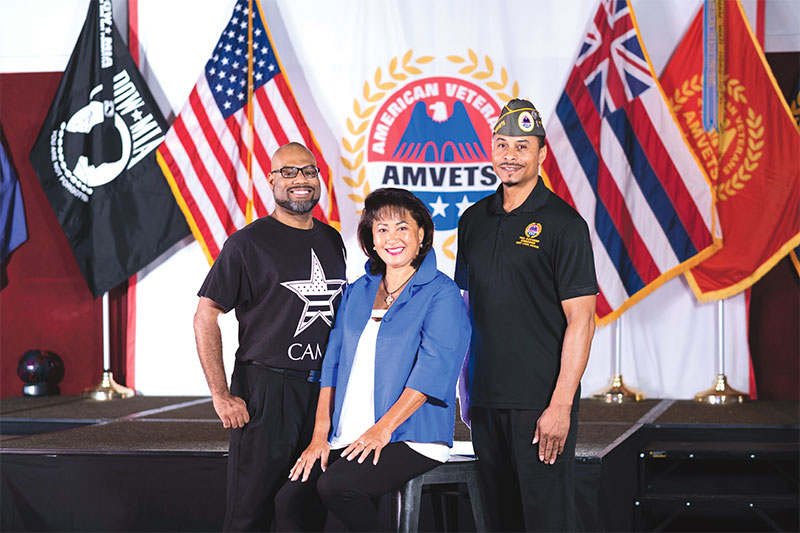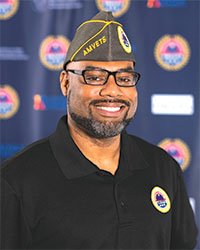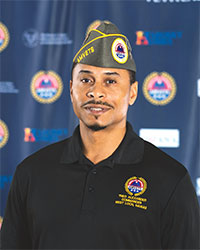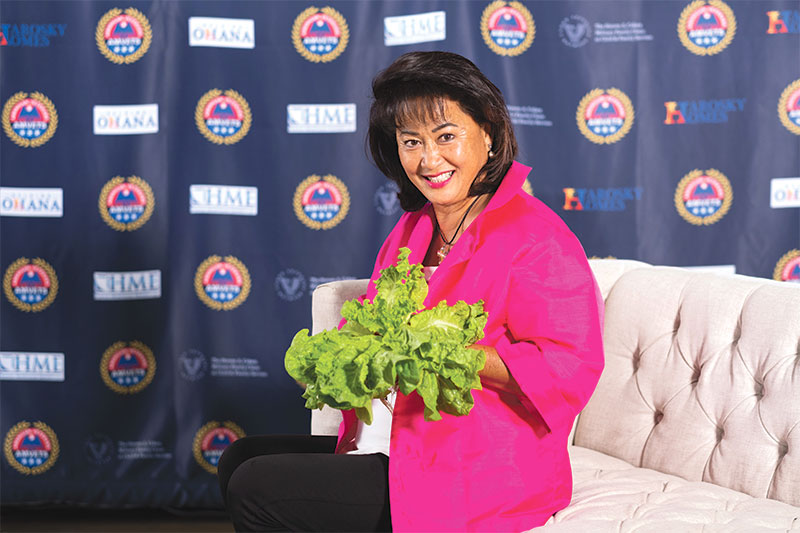Healing Our Warriors
Reducing the suffering of the country’s veteran population remains top of mind for James Trice and Theo Alexander of Complementary & Alternative Medicines of O‘ahu, and horticulture therapy coach Wendy Loh.
Among the countless veterans Theo Alexander has worked with over the years, there’s one in particular who still reminds him why he labors so diligently for U.S. service members and their families.
This veteran (who for privacy reasons will be referred to as Tom here) had fought in the Vietnam War, but had since lost the use of his legs, which kept him confined to a wheelchair, and became conversationally incoherent due to the number of prescription drugs he ingested daily.
When their paths first crossed, Alexander had already opened a care locker in Honolulu, a place where veterans could bring their marijuana plants and learn to grow and harvest cannabis without fear of judgment and rejection from those who still stigmatized the practice. It wasn’t long before a friendship was formed and Tom took an interest in consuming the herb for medicinal purposes — and with amazing results.
“He wound up reducing his dependence on his medications from 13 prescription drugs down to just three,” recalls Alexander. “We were also well on our way to helping him get rid of his remaining medications for diabetes and high-blood pressure as well.”
Yet despite the rapid decline in his prescription drug reliance, Tom was facing a problem. As a recipient of Housing and Urban Development-Veterans Affairs Supportive Housing assistance, his apartment was subject to periodic checks from the U.S. Department of Veteran Affairs (VA) to assess his living environment, and the presence of cannabis in his abode put his qualification status in jeopardy.
“When the VA got to his place one day, the inspector was very harsh with him because she saw his plants,” explains Alexander. “They started to threaten him, telling him that he was going to lose his benefits if he didn’t lose his plants.”
In a panic, Tom called Alexander and asked if he could store his cannabis at the care locker until after the VA’s follow-up inspection. Alexander agreed, and drove to Tom’s apartment that evening to do exactly what he promised.
“I came and got the plants,” says Alexander softly, pausing briefly to reflect on what’s become a painful memory. “Unfortunately, he didn’t make it.”
Tom had used a shotgun to end his life.
For Alexander, his friend’s suicide serves as a frequent reminder of the struggles facing many of the nation’s wounded warriors. It also fuels him to remain vigilant in helping to reduce the number of suicides (in 2016, the average was 22 a day, according to U.S. Department of Veterans Affairs statistics) and remedy what he calls “the invisible wounds of war,” or post-traumatic stress disorder. “When something like that happens to you, it’s like when any mother loses a child — it becomes your mantra,” says Alexander, noting that National PTSD Awareness Day (June 27) is just around the corner. “It’s something that you keep challenging yourself to inform people about.”
Today, Alexander and fellow veteran James Trice work to do just that. Both serve as co-founders and CEOs of Complementary & Alternative Medicines of O‘ahu (CAMO), a consulting and assessment service that provides health education and patient service referrals to U.S. veterans and their families. Its mission is to reduce chronic disease symptoms caused by debilitating disorders, namely PTSD, through holistic treatments and natural remedies. Among the services it provides veterans with are herbal (cannabis, mushrooms, etc.), horticulture, music, equine, massage and acupuncture therapies.
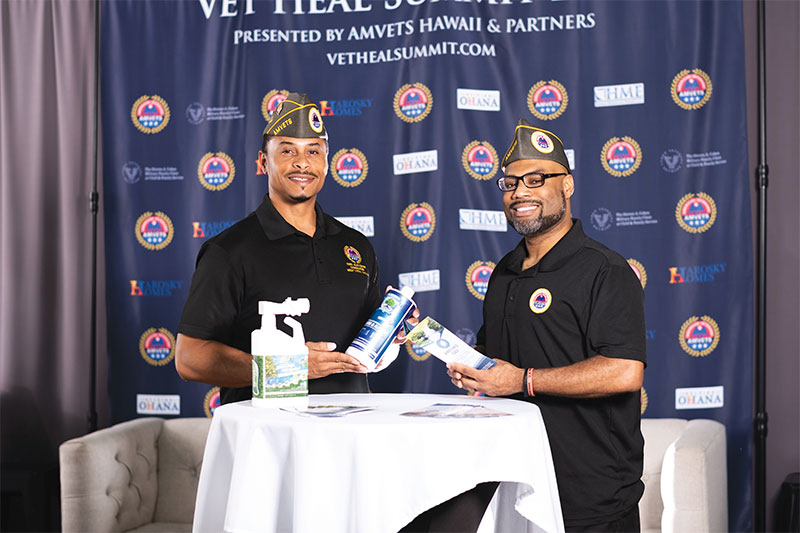
Theo Alexander, at left, and James Trice co-founded Complementary & Alternative Medicines of O‘ahu in 2017. Since then, they’ve provided a network of services to military veterans, including herbal and horticulture therapies.
“We have a network of services with a number of other people who help us, like Wendy Loh (see accompanying story at right),” says Alexander, a Navy veteran who has an extensive background in health administration, including experience in managing hospitals and rehab clinics on the mainland. “Just like a hospital, you may go in for something but then you’re referred to a surgeon who may be inside the network but not located within the same building. So, we try to follow that model … we want to refer patients to the therapy or to the clinician or to the service they’re going to need.”
Ultimately, he says it’s all about “improving access to alternative medical services.” But he also insists that CAMO does not work in opposition to the VA; rather, it labors hand in hand with the federal department at improving service members’ overall health while promoting what it calls “healthful living strategies.”
“We’re elevating the opportunity for people to have other choices when it comes to their health care outcome. We’re not going to displace anything that the VA or the FDA is doing or recommending or prescribing,” Alexander assures. “We just want to offer an alternative means to improving health care, and we have very good success rates with these things, whether it’s in equine therapy, which allows our vets to heal through horseback riding, or in music therapy. I mean just listen to music — who doesn’t get into a good mood when listening to a song you like?”
The organization, which plans to open a new Honolulu office in the near future, has been delivering its services out of the American Veterans Hawai‘i offices in ‘Ewa Beach in recent months. Prior to that, it maintained an office on North King Street.
But regardless of where it sets up shop, CAMO continues to impact the lives of scores of veterans.
“Not everybody goes through the program, but they will come in for the education,” says Alexander, adding that among those who have sought the latter are practicing clinicians, physicians and therapists. “In health care, it’s called how many lives have you touched. That means how many people have come into contact with your service and had some type of desired outcome, whether it’s improved education or whether they went ahead and joined the program.”
As a nonprofit established in 2017, CAMO relies on fundraising to fulfill its mission. Prior to COVID-19, it held three annual events — 329 Veteran Stand Down, Hawai‘i Cannabis Expo and Medical Cannabis Day. This year, the group plans to celebrate Medical Cannabis Day (June 14) and stage its Stand Down event in August to generate much-needed funding.
Aside from raising money to support CAMO’s mission and new location (“To lease a 10,000-square-foot office for our veterans’ specialty health clinic, it’s going to cost us around $30,000 a month,” notes Alexander), finding volunteer workers remains of paramount importance when it comes to adequately addressing the needs of the nation’s veteran population.
“We definitely need more medical assistants that are registered and certified, and who can help with patient intake and community outreach,” says Trice, who served as a healthcare specialist and combat medic while in the U.S. Army.
All About The Tower Gardens
Few people are as prepared as Wendy Loh, especially when it comes to food readiness. For more than a decade, she’s been encouraging others to eat healthy while championing self-reliance over dependency on modern food services.
Drop in at her apartment and you’ll discover an urban farm where kale, Mānoa lettuce and a variety of other fresh vegetables thrive. Aeroponics is Loh’s preferred method for indoor growing, but she insists that just about any system works.˚What’s important to her is that people simply get started.
“Just do it,” says the Nike slogan-sounding Loh, who regularly teaches groups of people, including a kūpuna class held each Monday at YMCA in Kaimukī, about cultivating their own gardens. “Awareness is the key. The more I grow and the more I eat, the more I feel like, ‘Wow! We should be eating less processed foods and more of the food we grow.’”
These days, the former business owner (she ran Kona Paradise Candies until retiring in 2009) has turned her focus to helping another group: military veterans. By partnering with the nonprofit Complementary & Alternative Medicines of O‘ahu, she plans to soon offer a horticulture therapy class in Honolulu called Vets On The Tower Gardens.
The program’s aim is to educate service members and their families on ways to carve out healthier and self-sustaining lives as horticulturists while gaining con˙ dence from their growing independence.
“The program is the perfect fit because we can do it indoors and it’s easier to maintain and manage,” explains Loh.“The Tower Gardens project uses 95% less water and 95% less space, so if a veteran lived in an apartment and wanted to start feeding his body healthier food, he could do all of it himself and afford it.
“That’s the whole idea — to teach them to grow their own food.”
For more information about Vets On The Tower Gardens, contact Loh at 808-429-8777 or jpaloha@hawaii.rr.com.


